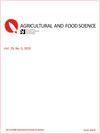福岛核事故对农业食品的影响——灾后10年的教训
IF 1.1
4区 农林科学
Q3 AGRICULTURE, MULTIDISCIPLINARY
引用次数: 1
摘要
2011年3月11日,日本发生了有史以来最强烈的地震,引发了强烈的海啸,并导致福岛核电站发生核事故。后者是一场“人为”灾难,对人们的生命、健康和财产、基础设施、供应链、经济、政策、自然和制度环境等产生了巨大影响。本文介绍了正在进行的工作,评估了福岛核灾难的准备工作和对农业食品的影响,确定了灾后恢复中的挑战,并总结了改善灾害风险管理的经验教训。日本没有为如此巨大的灾难做好充分准备,而农业食品部门和消费是受灾最严重的地区之一。这三场灾难是罕见但影响很大的事件,因此,有必要“未雨绸缪”。风险评估要包括可能发生的灾害的多种危害和多重影响,要与所有利益相关者讨论,并采取措施对所有人进行复杂灾害的教育和培训。有必要实现产权、法规、安全标准和规范的现代化,增强负责任的公共当局的能力,并改善不同行为者之间的协调。建立有效的公共资源配置机制,降低代理成本是十分重要的。农业食品链的不同环节具有不同的能力,需要不同的公众支持。农业、粮食和农村资产(以及损失)之间存在很强的“区域”相互依赖关系,因此正确定位风险并采取预防和恢复措施非常重要。灾害应对显示了小规模农场和粮食组织的重要作用,以及私人、市场和集体治理的高效率。在灾难发生之前、期间和之后,应通过一切可能的手段,立即以可理解的形式公布来自所有来源的所有可获得的信息。灾害为讨论、介绍和实施农业、经济、区域、能源、灾害管理等政策的根本变革提供了机会。重要的是要从过去的经验中吸取教训,为多重灾难做好准备,并确保“吸取的教训”不会被遗忘。本文章由计算机程序翻译,如有差异,请以英文原文为准。
Agri-food Impacts of Fukushima Nuclear Accident - Lessons Learned 10 Years after Disaster
On March 11, 2011, the strongest ever recorded in Japan earthquake occurred which triggered a powerful tsunami and caused a nuclear accident in Fukushima nuclear plant. The latter was a “manmade” disaster having immense impacts on people’s life, health, and property, infrastructure, supply chains, economy, policies, natural and institutional environment, etc. This paper presents work in progress and assesses preparedness for and agri-food impacts of the Fukushima nuclear disaster, identifies challenges in post-disaster recovery, and withdraws lessons for improving disaster risk management. Japan was not well prepared for such a huge disaster while the agri-food sector and consumption have been among the worst-hit areas. The triple disaster was a rare but high-impact event, therefore, it is necessary to “prepare for the unexpected”. Risk assessment is to include diverse hazards and multiple effects of a likely disaster, it is to be discussed with all stakeholders, and measures taken to educate and train all for complex disasters. It is necessary to modernize property rights, regulations, safety standards, and norms, enhance the capability of responsible public authorities and improve coordination between diverse actors. It is important to set up mechanisms for effective public resource allocation and reduction of agents’ costs. Different elements of the agri-food chain have dissimilar capabilities requiring differential public support. There is a strong “regional” interdependency of agrarian, food, and rural assets (and damages), and it is important to properly locate risk and take prevention and recovery measures. Disaster response demonstrated the important role of small-scale farms and food organizations, and the high efficiency of private, market, and collective governance. Before, during, and after a disaster, all available information from all sources is to be immediately publicized in understandable form through all possible means. Disaster provides an opportunity to discuss, introduce and implement fundamental changes in agricultural, economic, regional, energy, disaster management, etc. policies. It is important to learn from past experiences, prepare for multiple disasters, and make sure that “lessons learned” are not forgotten.
求助全文
通过发布文献求助,成功后即可免费获取论文全文。
去求助
来源期刊

Agricultural and Food Science
农林科学-农业综合
CiteScore
2.50
自引率
0.00%
发文量
22
审稿时长
>36 weeks
期刊介绍:
Agricultural and Food Science (AFSci) publishes original research reports on agriculture and food research related to primary production and which have a northern dimension. The fields within the scope of the journal include agricultural economics, agricultural engineering, animal science, environmental science, horticulture, plant and soil science and primary production-related food science. Papers covering both basic and applied research are welcome.
AFSci is published by the Scientific Agricultural Society of Finland. AFSci, former The Journal of the Scientific Agricultural Society of Finland, has been published regularly since 1928. Alongside the printed version, online publishing began in 2000. Since the year 2010 Agricultural and Food Science has only been available online as an Open Access journal, provided to the user free of charge. Full texts are available online from 1945 on.
 求助内容:
求助内容: 应助结果提醒方式:
应助结果提醒方式:


